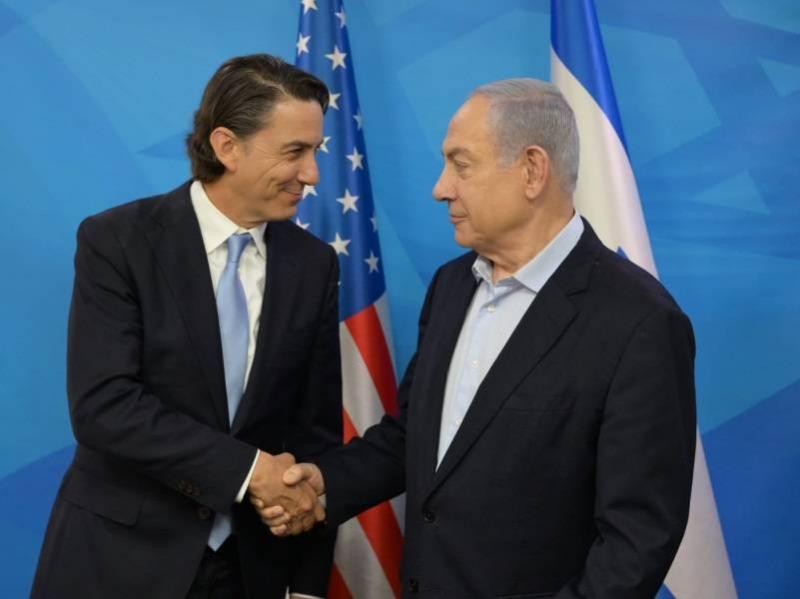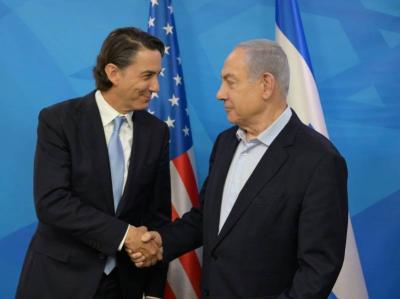At the same time that U.S. envoy Amos Hochstein expresses optimism about the possibility of reaching a long-term agreement between Israel and Hezbollah following his talks in Beirut and Tel Aviv, Hebrew media (on Sunday) published statements from unnamed Israeli generals demanding the government "act in the spirit of the new circumstances created by the Hamas attack on October 7" and launch a limited war on Lebanon, according to "Asharq Al-Awsat."
The "Walla" website reported that the generals sent a message to the Israeli military leadership and political command stating that it is time to shift the priority from focusing on the south (Gaza Strip) to the north (the front with Hezbollah), changing the war's objectives from a limited defensive battle to a lethal defensive battle and carrying out a limited attack. They argued that a more painful price must be extracted from Hezbollah and that pressure should be shifted to its arena. They confirmed that the Israeli army is effectively engaged in battle with Hezbollah, which should lead to a political move with the group, but this battle won’t result in a cease-fire or a withdrawal of its forces behind the Litani River. They emphasized that it is unacceptable to fall back into the equations that existed before October 7. Today, there are tens of thousands of Israelis displaced from their homes in Galilee, and Hezbollah is trying to impose a price for the Israeli assassinations, attempting to affect sensitive infrastructure within the home front. This refers specifically to the intensive bombing conducted by Hezbollah on an Israeli Air Force base deep inside, in response to the assassination of Hamas leader Saleh Al-Arouri. Therefore, after achieving gains in Gaza, it is necessary to move to the north, utilize the mobilization of reserve forces, and head toward a serious battle against Hezbollah.
The site noted that the government intends to hold discussions on the contents of the message in the coming days to discuss appropriate military plans concerning this. Meanwhile, the "Washington Post" reported that U.S. officials indicated that Israeli Prime Minister Benjamin Netanyahu might seek to expand the war, contrary to U.S. administration advice, as a basis for his political survival amidst internal Israeli criticism of his government's failure to prevent the October 7 attack. Officials expect the Israeli army will face challenges in a war against Hezbollah, emphasizing that the group wants to avoid escalation at a time when its Secretary-General Hassan Nasrallah, in a speech last Friday, proclaimed his intention to respond to Israeli aggression and the assassination of Saleh Al-Arouri in the southern suburb of Beirut. At the same time, Nasrallah hinted at the potential for negotiations concerning border demarcation with Israel to recover occupied territories in Shebaa farms.
The newspaper indicated that secret assessments by the U.S. Defense Intelligence Agency (DIA) suggested that the Israeli army is expected to face difficulties in achieving its objectives in a war against Hezbollah, alongside ongoing warfare in Gaza, where many resources are spread across multiple fronts.
White House and State Department officials stated that the risk of Israel launching an attack on Hezbollah has never disappeared, but there has been broader concern about escalation in recent weeks, particularly as Israel announced a temporary withdrawal of several thousand forces from Gaza. An official explained that the military intelligence assessment was that escalation in Lebanon could lead to the dispersion of Israeli forces. He stated that pilots are tired, and the aircraft need maintenance and re-equipping. They would face more dangerous missions in Lebanon than in Gaza, where Hamas has few anti-aircraft defenses capable of taking down attacking planes (unlike what Hezbollah possesses).
Hochstein, according to "Asharq Al-Awsat," held a series of meetings with Netanyahu and the two ministers involved in the war command, Yoav Gallant (Defense) and Benny Gantz. He then returned to Beirut to attend to responses to Israeli questions but conveyed a cautious sense of optimism, linking his efforts to the situation in the Gaza Strip. He expected Israel to proceed with its withdrawal plan from the Gaza Strip within the third phase of the war, which would allow for a renewed exchange of prisoners negotiations with Hamas. He further confirmed that this withdrawal would assist Hezbollah in getting off the tree and agreeing to a cease-fire, accepting the Israeli condition to withdraw its forces from the southern Litani or slightly less, in exchange for Israel withdrawing from Shebaa Farms and Ghajar, leading to negotiations over the remaining border disputes on the Blue Line.
Hochstein stated that both parties affirmed their preference for political negotiations over military operations, despite the wartime rhetoric and mutual threats, as both operate under an umbrella that threatens an outbreak of war on the northern front. The U.S. envoy emphasized that Nasrallah clearly indicated he was not interested in war. He threatened Israel with regret should it initiate a conflict, stating in other words that he would not be the one to start it. He presented what he offers now as significant sacrifices on his part in supporting Gaza, which have been paid for by the party's youth with their lives. Israel remains committed to responding to Hezbollah's bombardment, but it does not initiate attacks. Iran has asserted that it is not a partner in the war. All parties are sending mutual messages of reassurance. Hochstein urged both sides to continue exercising caution in their operations and not to launch a detrimental strike that could drag the region into a war neither side desires and to adhere to the American and European demand not to open a front in the north that might threaten a regional or even global war.
In response to these reports, Minister Gantz tweeted that the situation where northern border residents cannot return to their homes necessitates a swift resolution. The world must remember that it is the terrorist organization (Hezbollah) that initiated the escalation. However, Israel is interested in a political solution. If this does not happen, then the State of Israel and the Israeli army will eliminate this threat. All war cabinet members share this position. The only consideration is the security of Israel, which is any state's duty to its citizens.




